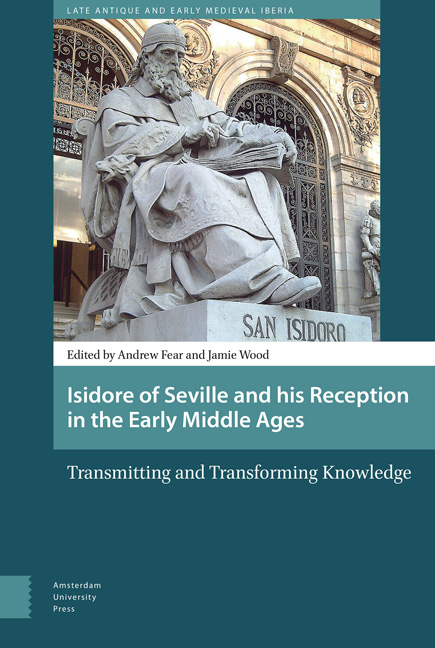 Isidore of Seville and his Reception in the Early Middle Ages
Isidore of Seville and his Reception in the Early Middle Ages Book contents
- Frontmatter
- Contents
- Preface: Paul Fouracre, University of Manchester
- 1 Introduction
- 2 A Family Affair: Leander, Isidore and the Legacy of Gregory the Great in Spain
- 3 Variations on a Theme: Isidore and Pliny on Human and Human-Instigated Anomaly
- 4 Putting the Pieces Back Together: Isidore and De Natura Rerum
- 5 The Politics of History-Writing: Problematizing the Historiographical Origins of Isidore of Seville in Early Medieval Hispania
- 6 Isidorian Texts in Seventh-Century Ireland
- 7 Isidore of Seville in Anglo-Saxon England: The Synonyma as a Source of Felix’s Vita S. Guthlaci
- 8 Hispania et Italia: Paul the Deacon, Isidore, and the Lombards
- 9 Rylands MS Latin 12: A Carolingian Example of Isidore’s Reception into the Patristic Canon
- 10 Adoption, Adaptation, & Authority: The Use of Isidore in the Opus Caroli
- Abbreviations
- Index
10 - Adoption, Adaptation, & Authority: The Use of Isidore in the Opus Caroli
Published online by Cambridge University Press: 12 December 2020
- Frontmatter
- Contents
- Preface: Paul Fouracre, University of Manchester
- 1 Introduction
- 2 A Family Affair: Leander, Isidore and the Legacy of Gregory the Great in Spain
- 3 Variations on a Theme: Isidore and Pliny on Human and Human-Instigated Anomaly
- 4 Putting the Pieces Back Together: Isidore and De Natura Rerum
- 5 The Politics of History-Writing: Problematizing the Historiographical Origins of Isidore of Seville in Early Medieval Hispania
- 6 Isidorian Texts in Seventh-Century Ireland
- 7 Isidore of Seville in Anglo-Saxon England: The Synonyma as a Source of Felix’s Vita S. Guthlaci
- 8 Hispania et Italia: Paul the Deacon, Isidore, and the Lombards
- 9 Rylands MS Latin 12: A Carolingian Example of Isidore’s Reception into the Patristic Canon
- 10 Adoption, Adaptation, & Authority: The Use of Isidore in the Opus Caroli
- Abbreviations
- Index
Summary
The art historian Ernst Kitzinger once framed the period between the fourth and the ninth centuries as one overwhelmed with talk about images. The eighth century certainly would seem to illustrate his case. The adoption and subsequent abandonment of Iconoclasm by the Byzantine Empire rekindled a long-standing debate about the appropriateness of imagery in Christian worship throughout the Mediterranean world, engaging not only the Byzantines, but also the papacy and the emergent Carolingian Empire. The formal repeal of Iconoclasm at the 787 Second Council of Nicaea produced not one but two Carolingian treatises that explicitly discussed and rejected Byzantine image theory. Both treatises, the earlier, and now lost, Capitulare adversus Synodum and the later Opus Caroli regis Contra Synodum (often referred to as the Libri Carolini), often are contextualized as ‘response’ texts, written specifically to combat the conclusions reached at Nicaea, where the Byzantines revealed a new image-inclusive spiritual policy. That Nicaea was the instigation behind these two texts cannot be denied; however, the presumed centrality of image theory in the Opus Caroli can obscure the broader insight it (and presumably the lost Capitulare) provides on the emergent linguistic philosophy within the Carolingian intellectual world. Yes, the Opus Caroli was written to combat a new Byzantine perspective of the spiritual worth of images, but in doing so it advocated a specifically Carolingian understanding of language, reflective of a growing incorporation of the etymological and linguistic philosophy of classical, late antique, and early medieval writers, specifically Isidore of Seville. The core of the Opus Caroli is not images, but language.
What has often been called the working copy of the Opus Caroli (Vaticanus Latinus 7207) clearly once commanded considerable attention at the Carolingian court. At least four distinct hands worked on the text, resulting in over 3,400 distinct corrections as well as marginal notes in Tironian shorthand. Although this early manuscript lacks a title, preface, or the majority of Book One, a later, more complete, and polished manuscript (Paris, Bibliothéque de l’Arsenal, MS 663) attributes the work to Charlemagne (‘The Work of Charles against the Synod’), a textual example of the Frankish king's spiritual as well as political sphere of influence.
- Type
- Chapter
- Information
- Isidore of Seville and his Reception in the Early Middle AgesTransmitting and Transforming Knowledge, pp. 209 - 230Publisher: Amsterdam University PressPrint publication year: 2016
- 1
- Cited by


